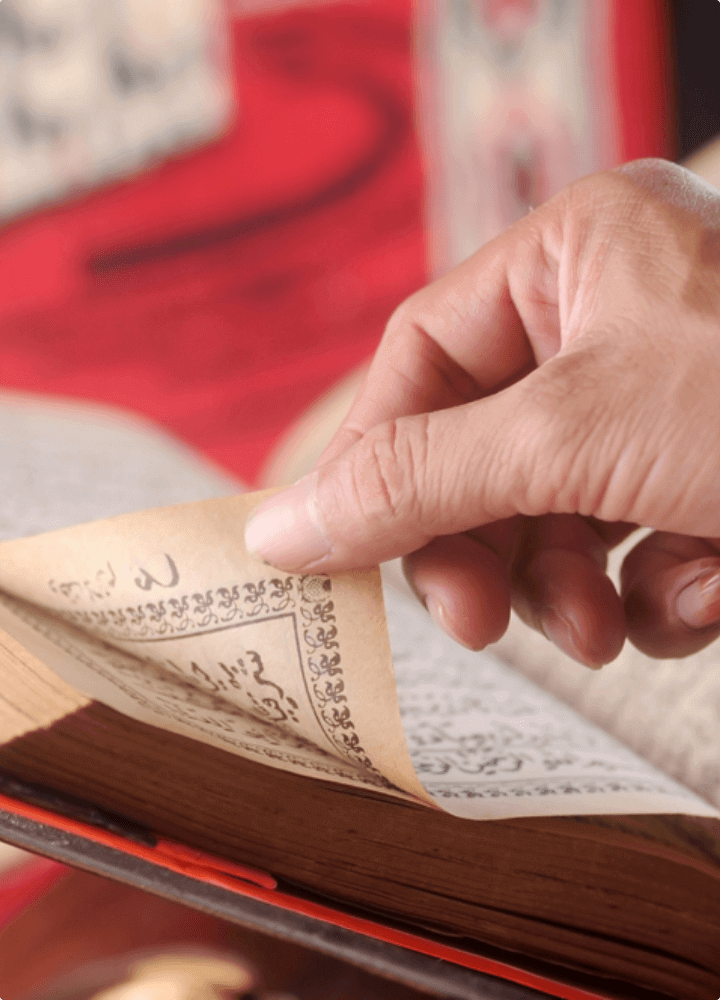The Qur’an An
Eternal Challenge

Our Lord, perfect for us the light You have given us, and forgive us. Indeed You have power over all things, and You answer the prayers of Your servants.
written by
Muhammad Abdullah Draz
Discover Book Browse all chapters
of the book
Divine Text, Divine Meaning
It is universally known, beyond any shred of doubt, that this sublime book, the Qur’an, was delivered to mankind through Muhammad ibn ᶜAbdullāh ibn ᶜAbd al-Muṭṭalib (peace be on him), an unlettered Arab man born in Makkah in the sixth century. This much is not subject to disagreement between believers and non-believers. No other book or event in history is so universally accepted as such.
was Muhammad ibn ᶜAbdullāh (peace be upon him) its author, expressing his own thoughts?
We read in this very book that it is not the composition of the man who brought it to us. It is described as: “The word of a noble and mighty Messenger, who enjoys a secure position with the Lord of the Throne.
CHAPTER II
The Source of The
Qur’an

The Prophecies of the
Qur’an
CHAPTER III
The question of the Prophet having nothing to do with the writing of the Qur’an is too self evident to need any verbal admission from him or a study of his morality.
It is definitely sufficient to prove a person’s innocence of a particular action of commission that his very nature shows his physical inability to do or produce it.
Let us now reflect on whether Muhammad, the unlettered Prophet, could have produced the Qur’anic concepts and meanings on the basis of his own knowledge and intellectual means.
Atheists, who have no shortage of ignorance, will claim that he could.

- 001 . Certainty of the Future
Examples of the first type relate to the religion of Islam and that God has ensured that it will remain forever, and will never be wiped out.
READ MORE - 002 . A Challenge to All Mankind
A further example is the challenge to all creation to produce anything that resembles the Qur’an at any time: “Say: If all mankind and the jinn combined to write the like of this Qur’an, they would surely fail to come up with anything like it, even though they would all join efforts to do so.”
READ MORE - 003 . Guaranteed Protection
A third example is found in the verse in which God guarantees to protect His Messenger and assures him of his safety until he has completed his task of conveying God’s message..
READ MORE - 004 . Promises for the Future
The second type of prophesies relate to the future of the new faith and those who accepted its message in the early days.
READ MORE - 005 . Future Events Involving the Unbelievers
The third type of prophesies we find in the Qur’an relate to what the future holds for the unbelievers. The first example we will give relates to the hardened attitude the people of Makkah adopted towards the new message of Islam.
READ MORE
They would argue that his innate intelligence and penetrating insight enabled him to distinguish right from falsehood, decent moral values from foul ones, and good from evil.
They would even go further and claim that if there was anything in the heavens which could be grasped by deep reflection or sound nature or inspiration.
Muhammad would have grasped it, given his undistorted nature, great intellect and profound abilities for reflection.
We believe that his qualities and characteristics are far more splendid than what such atheists credit him with
Muhammad
himself
(peace be upon him)
was subject to people’s attempts to give him false evidence so that he would issue an unjust verdict or defend a guilty person, thinking that he was innocent. He only corrected himself when God, who knows all, gave him the right information.
CHAPTER IV
It is inevitable that anyone who seeks to learn the source of the Qur’an should expand the area of his investigation.
If he cannot establish that source when he considers the insight and intelligence of the person who delivered the Qur’an, he should surely look for it, and find it, inevitably, in education and study.
A speaker either composes what he says or copies it from another source. There is no other alternative.
The man reciting and conveying the Qur’an to people was not someone who could himself refer to books and encyclopaedias.
Even his enemies admit that he grew up and lived without receiving any education.

Muhammad’s
Teacher
A Prelude to the Study
of a Unique Book
Our method of investigation concerning the source of the Qur’an and how it came to
be preached by the Prophet Muhammad (peace be upon him) has so far refrained
from tackling the Qur’an in its nature and substance.












